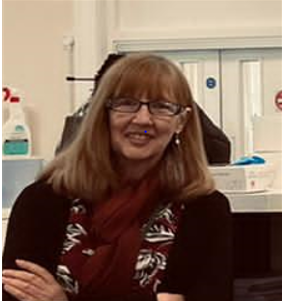Attending your first court hearing or knowing how best to support a victim of child abuse can be a nerve-racking experience for some newly qualified social workers.
But having the support of an in-house specialist team of social workers, dedicated to providing practical and emotional help to inexperienced staff, has made the difference to newly qualified practitioners like Hollie and Ally.
“One of my parents made an application to court in June, and I had to do a risk assessment to decide if contact was suitable for the family,” says Hollie, who works in one of the council’s locality teams.

Hollie
“At that moment, I felt very overwhelmed. I said to my manager, at the time: ‘I’ve not done this – can I have support?’ She then spoke to Wendy, a specialist social worker, and Wendy volunteered to offer support and guidance, and help her through the process.
“On the day I went to court, Wendy sent me a little text just saying good luck. That was quite reassuring because it showed that she wasn’t just there to help me on the piece of work – she was hoping that it all went okay.”
Creating a competent workforce
Wendy has 23 years of experience in social work and a background in child protection, safeguarding and court work. She is one of six specialist social workers that form Cardiff Council’s team of non-case holding practice lead practitioners.
Established in March 2022, the practice lead programme was set up to address gaps in practical experience that newly qualified social workers may have. Of the practice leads, Nancy brings knowledge in best practice approaches, while Hannah brings experience in mental health, substance misuse and domestic violence issues to the group.

Eunice
Eunice supports social work assistants in developing a clear career pathway and Sherelle brings 15 years of experience in child protection in Australia and England. She ties in her expertise in trauma-informed work and, along with her practice lead colleagues, helps newly qualified social workers explore ideas around empathy and compassion – for the families and children they work with, but also for themselves.
“We are encouraging them to think, ‘you’re a social worker, you’re the agent of change – how are you using that?”, says Sherelle. “And what happens if you’re triggered or finding something difficult? The idea is to help them to look after themselves and build their confidence, so they are better able to look after families.”

Sherelle
This is something that both Hollie and Ally can identify with.
“I know I am more than competent but I’m just not the most confident,” says Hollie. “When I was working with Wendy on the court work, she allowed me to take control, which was challenging for me, but she was also there to point me in the right direction if I was going off-track. She made sure I was not overwhelmed, and that my diary was not too full, and she helped me manage that alongside obviously quite a difficult piece of court work.
“Although the day in court was not the smoothest, the judge said that for a first piece of court work, what I had done was of high quality. My confidence massively grew, and I told Wendy that without her I would have really struggled.”
Transitioning from abroad
Ally’s experiences are similar. She joined one of Cardiff’s south locality team eight months ago, having gained her social work training and experience in India. The transition has involved her learning new processes and child protection laws and adapting how she tackles complex and sensitive family situations.

Ally
“When I came, I lacked a lot of confidence. I knew I had back up from my team but when you go to the families, it’s just you,” says Ally. “And that means making sure you are communicating effectively and appropriately.
“I remember there was an incident with three siblings with learning difficulties where there was a sexual abuse disclosure. The siblings kept changing their statements because they were scared. It was a sensitive issue, and I was dealing with kids, so I wasn’t sure how to interview them to get the true information.

Gail Collier
“Although my manager had gone through the process with me, having Gail [a practice lead with expertise in sexual exploitation] come out with me for two or three visits, and demonstrate how to deal with it made a big difference. This gave me the confidence to know that if this happens again, I now know what to do.”
Developed by social workers for social workers
“There are a lot of processes in social work, and I think that’s a scary part of the job when you are newly qualified,” says Gail, who has worked on sex trafficking cases in the Gambia as well as Wales.
“Sexual exploitation is an area of social work that I feel is not really looked at in training or within other local authorities [that I’ve worked at]. It is seen as more of a specialist service when it shouldn’t be. It should be across all the workforce really.
“We can accompany newly qualified staff on visits, observe them, for example, when they chair meetings. We can model what good practice looks like when they are engaging with families; show them how to talk to families and how to deliver direct work with children.”
Pillars of support
Workshops are one of the ways that practice leads can cement best practice knowledge and offers newly qualified social workers an additional layer of support on top of what they get from their line managers.
Wendy says: “Our aim is to create a really skilled, knowledgeable, competent and confident workforce that know that there’s someone there – outside their direct line manager – to talk to, to have reflective conversations with and to hold their hand through new pieces of work.”

Wendy Wyatt
According to Ally, there are various ways that social workers like her gain support.
“There is a common platform called ‘Practice Issues’ where we can ask questions about practice, and you can go anytime to the practice leads if you have any issues, give an appointment and they will come with you and give you training.” she says.
Role play sessions
Newly qualified social workers have access to half-day monthly workshops that offer training in areas including motivational interviewing, how to conduct a core group meeting, recording statutory call visits and parenting assessments.
There are also role play sessions where newly qualified social workers take on a challenging scenario and act out how they would tackle it, while the practice lead observes and offers positive guidance. Role modelling exercises are also invaluable, according to Ally, and have helped her to refine how she communicates with families and young people.
“I used to focus on open-ended questions such as, ‘how was your day?’, and get one-word answers but I’ve learnt to develop follow-up questions to get more out of the person,” says Ally.
The practice leads are also part of the induction process for newly qualified social workers and have developed guidance designed to make them feel settled, stable and like they have purpose in the role.
Ally says: “I still need help in lots of areas because each case is different, but I can say that if I get a similar family again, I know how to deal with it. My team is brilliant and so supportive – not just my manager but others in the south locality where I work. I can go to them at any time. I’ve already encouraged four of my friends in other local authorities to apply to the council.”
Natasha Hidderley, operational manager at transformation and specialist services at Cardiff Council, says: “The training structure prior to the practice leads programme being developed was more generic. We developed a programme specific to the needs of newly qualified social workers and social work assistants with a more structured and robust induction process. The programme has a practice lead sitting in each core area of our statutory services to offer an accurate and targeted level of training, learning and development.
“The practice leads work collaboratively, however, they also offer a streamlined system of support depending on the specific role and remit of all our NQSWs that work across many different areas and settings. We now have a practice lead programme that addresses these individual needs as well as supporting the Welsh Continuing Professional Education and Learning first three years in practice framework.”
If you are considering a career at Cardiff Council, look at its latest jobs.
Read other articles about Cardiff below:
How one council is working to amplify the voice of the child
“Even before I started working here, I felt valued.”




 Facebook
Facebook X
X LinkedIn
LinkedIn Instagram
Instagram